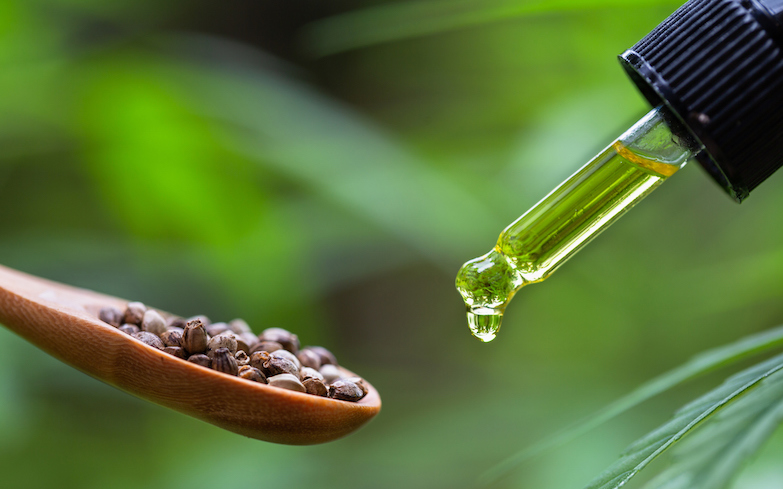
FDA warns consumers that the agency has not evaluated most CBD products and cannot say they are safe.
Celebrities are promoting cannabis derived products as part of a growing wellness trend. Kim Kardashian had a cannabidiol (CBD) themed baby shower. Melissa McCarthy used CBD oil to relieve foot pain. Whoopi Goldberg started selling CBD infused products to alleviate “menstrual discomfort.”
But the U.S. Food and Drug Administration (FDA) has warned the public that CBD products have not been approved by the agency and can expose consumers to serious health risks.
In a consumer update published recently, FDA said that current data suggest that CBD products pose human and animal safety concerns. FDA recognized that limited information exists on the long-term safety and quality of CBD products, but stated that the available research indicates that the substance can cause liver damage, interact with other medications, and lead to other adverse side effects.
Although CBD can be sold legally in the United States, the products do not undergo FDA’s extensive drug approval process. Under the Federal Food, Drug, and Cosmetic Act (FDCA), substances are considered drugs if they are intended for therapeutic or medical use or are supposed to affect the structure or function of the body. But because many CBD products are not labeled or marketed for medical use, FDA does not evaluate the products before they enter the market.
Due to FDA’s limited data, the agency said it cannot conclude that CBD products are safe. In a press release accompanying the agency’s consumer update, Amy Abernethy, Principal Deputy Commissioner of FDA, said, “we remain concerned that some people wrongly think that the myriad of CBD products on the market, many of which are illegal, have been evaluated by the FDA and determined to be safe, or that trying CBD ‘can’t hurt.’”
FDA’s recent announcements were released in response to CBD’s growing popularity and mainstream use. Although CBD—a compound extracted from marijuana or hemp plants—does not produce the “high” commonly associated with marijuana, it has been marketed for its purported health and wellness benefits.
Based on limited studies, the substance has been advertised to improve overall wellness by helping with common conditions such as insomnia, chronic pain, and anxiety. Preliminary data have also suggested that CBD may possibly treat certain types of cancer. These potential health benefits have captured the public’s interest. According to a recent study, in April of 2019 alone there were 6.4 million Google searches for CBD. Numerous consumers have shared stories on social media about how they believe CBD has helped them manage their pain or improve their anxiety.
The availability of CBD also increased over the past year. The Agriculture Improvement Act of 2018 legalized hemp production, allowing producers to cultivate hemp and extract CBD for commercial products. It is estimated that, by 2022, the CBD market will have grown about 40 times the size of the 2018 market.
Although consumers can find CBD oils, foods, creams, and beverages for sale, FDA cautioned that some of the companies selling such products are making illegal health claims. FDA recently issued warning letters to 15 companies for violating the FDCA. These companies allegedly marketed their CBD products as drugs without FDA evaluating or approving the products. The agency said that these misleading claims are a public health concern because people may delay seeking medical care if they think their illnesses can be managed or treated with CBD products.
FDA has only approved a single CBD product—a prescription drug that can treat two rare forms of epilepsy. In granting its approval, the agency recognized that the benefits of the drug outweighed the potential risks to the specific patient population. But in the process of evaluating the drug, FDA identified many safety concerns associated with CBD, suggesting that CBD products may not be safe for the general public.
For example, FDA noted during the epilepsy drug approval process that patients showed signs of liver damage. Over time, this damage could lead to liver failure, a potentially fatal diagnosis. The agency also warned that CBD can interact with other drugs, reducing the effectiveness of other medications and causing adverse side effects. These health risks can occur without a consumer realizing that damage is accumulating.
The agency recognized that these risks can be controlled if a physician is monitoring the CBD dosage and the patient’s condition. But widespread commercial use is dangerous because consumers are not being tested for potential side effects or screened for drug interactions.
FDA also identified areas where more research is needed. The agency said it is “actively” working to determine if the products are safe for “special populations,” such as children, elderly, or pregnant or lactating women. It is also unclear whether CBD produces side effects from long-term use.
To address these safety concerns but also allow research to develop, FDA held a public hearing last spring to gather data about CBD products’ quality, safety, and manufacturing processes. FDA received over 4,000 comments in connection with the hearing. Many individuals shared personal stories of how CBD has helped them manage chronic conditions like anxiety or inflammation. Manufacturers cited research showing CBD’s medicinal properties and asked FDA to provide a clear regulatory framework to encourage further research.
One pharmaceutical company urged FDA to establish uniform testing and labeling requirements and remove inconsistencies between state and local regulations. A federal framework would provide companies with greater guidance on how to research and develop new products that have therapeutic value, the company asserted.
FDA has acknowledged that CBD’s regulatory framework needs to be modified and agency officials have discussed whether further legislation is needed. “We recognize the significant public interest in CBD and we must work together with stakeholders and industry to fill in the knowledge gaps about the science, safety and quality of many of these products,” Abernethy stated.



